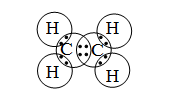Chapter : 3. Chemical Reactions
Double covalent bond
Double covalent bond :
A double covalent bond is formed when two pairs of electrons are shared between the two combining atoms. A sharing of two pairs of electrons is shown by marking two short lines between the symbols of the two atoms.
EXAMPLES :
1. Formation of an oxygen molecule (O2) :
An atom of oxygen contains six electrons in its valence shell. It requires two more electrons to attain a stable eight-electron configuration (octet). This is achieved when each of the two oxygen atoms shares its two electrons with the other, resulting in the formation of a stable oxygen molecule.

Pictorially, the oxygen molecule may be represented as in figure.

2. Formation of an ethylene molecule (C2C4) :
In the formation of an ethylene molecule (C2C4) , each of the two C atoms combines with two H atoms to form two single covalent bonds. The remaining two electrons of each C atom form a double bond between the two C atoms.

Pictorially, a molecule of ethylene (C2H4) may be represented a in figure.

A double covalent bond is formed when two pairs of electrons are shared between the two combining atoms. A sharing of two pairs of electrons is shown by marking two short lines between the symbols of the two atoms.
EXAMPLES :
1. Formation of an oxygen molecule (O2) :
An atom of oxygen contains six electrons in its valence shell. It requires two more electrons to attain a stable eight-electron configuration (octet). This is achieved when each of the two oxygen atoms shares its two electrons with the other, resulting in the formation of a stable oxygen molecule.

Pictorially, the oxygen molecule may be represented as in figure.

2. Formation of an ethylene molecule (C2C4) :
In the formation of an ethylene molecule (C2C4) , each of the two C atoms combines with two H atoms to form two single covalent bonds. The remaining two electrons of each C atom form a double bond between the two C atoms.

Pictorially, a molecule of ethylene (C2H4) may be represented a in figure.

Trending Articles & Blogs
- Physics Tutor, Math Tutor Improve Your Child’s Knowledge
- How to Get Maximum Marks in Examination Preparation Strategy by Dr. Mukesh Shrimali
- 5 Important Tips To Personal Development Apply In Your Daily Life
- Breaking the Barriers Between High School and Higher Education
- 14 Vocational courses after class 12th
- Tips to Get Maximum Marks in Physics Examination
- Get Full Marks in Biology Class 12 CBSE
Download Old Sample Papers For Class X & XII
Download Practical Solutions of Chemistry and Physics for Class 12 with Solutions
Recent Questions Asked
- Newton’s laws of motion asked by Dr. Mukesh Shrimali
- Process of nutrition in Amoeba asked by Rajiv Sharma
- Importance of studying physics subject in school after 10th asked by Rajiv
- Refraction Through Prism in Different Medium asked by Kirti Sharma
- Ratio and Proportion Question asked by Education Desk
- Explain all the 12 tenses with example asked by Qwerty
- Refraction Through Prism in Different Medium asked by Seema Shrimali